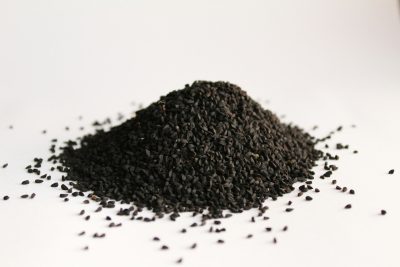 Are you familiar with black seed oil? Black seed oil, also referred to as black cumin oil, is harvested and cold-pressed from the small black seeds of the Nigella sativa plant. In literature, this oil is recognized as both an essential oil and a carrier oil and is marketed to the public under either classification (the classification of black seed oil by a specific company or distributor will be indicated on product labels).
Are you familiar with black seed oil? Black seed oil, also referred to as black cumin oil, is harvested and cold-pressed from the small black seeds of the Nigella sativa plant. In literature, this oil is recognized as both an essential oil and a carrier oil and is marketed to the public under either classification (the classification of black seed oil by a specific company or distributor will be indicated on product labels).
Black seed oil was traditionally used in Middle Eastern herbal medicine to maintain and support a healthy immune system function. This supplement also acts as an antioxidant to reduce the formation of free radicals in the body and helps maintain healthy blood sugar. Black seed oil is known as “The Seed of the Blessing” or habbatus sauda in the Middle East. It has been used in a variety of ways dating back for more than 3,000 years and was even found in the tombs of Egyptian pharaohs.*
Properties and Features
- Antioxidant
- Reduces free radicals formed in the body
- Maintain general health and wellbeing
- Helps maintain healthy blood sugar
- Supports immune system health
- Maintains a healthy immune system function
- Peppery, oregano-like flavor
- Contains essential fatty acids, antioxidant properties, vitamins and trace minerals.
- Composed of unsaturated fats including linoleic and oleic acid.
Please note: while black seed oil and Black cumin are terms used interchangeably, some herbalists and aromatherapists state they belong to different plant families and have distinct flavors and uses.
Black seed oil is derived from the seeds of the Nigella sativa plant, also known as black caraway or fennel flower. This plant belongs to the Ranunculaceae family and is native to southwestern Asia, the Middle East, and North Africa. Used for centuries in traditional medicine, black seed oil addresses various conditions like respiratory issues, digestive problems, and skin disorders.
Black cumin, derived from the seeds of the Bunium bulbocastanum plant, belongs to the Apiaceae family and is native to the eastern Mediterranean and western Asia. These seeds have a pungent, bitter taste and are used as a spice in Middle Eastern and Indian cuisine. Despite often being confused with black seed oil, black cumin comes from a different plant.
Cumin is sourced from the seeds of the Cuminum cyminum plant, also in the Apiaceae family. Native to the eastern Mediterranean and widely cultivated in the Middle East and Asia, cumin seeds have a warm, earthy flavor and are used globally as a spice.
In summary
- Black seed oil comes from Nigella sativa
- Black cumin comes from Bunium bulbocastanum
- Cumin comes from Cuminum cyminum
I reviewed an article offering even more information about black seed oil, recently published at Healthinsiders:
Black Seed Oil: The Unbiased Scientific Truth, Evidence-Based Health Benefits, Side Effects and More
*excerpted and summarized from: https://www.youngliving.com/en_au/products/black-seed-oil





